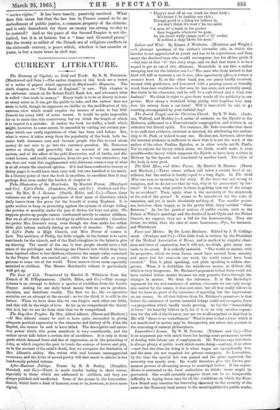The Gold Mine, and Other Poems. By Harriet E. Hunter.
(Hurst and Blackett.)—These verses seldom fall below a certain level of ex- cellence, but the author is hardly equal to a long flight. In The Gold Mine one sees no meaning in the story. If the hero was not wrong to emigrate, and we do not see that he was, why is he persecuted by for- tune? If he was, what justice is there in getting him out of the scrape by an accident? Then, again, what is the necessity of the shipwreck at the end of the poem ? It seems to be introduced for the sake of sensation, and yet is made absolutely nothing of. The smaller poems are, however, often happy, as in the pretty little fancy entitled "Glass Between." As for the poetical notices of public events, such as the Prince of Wales's marriage and the deaths of Lord Clyde and the Prince Consort, we suppose they are a bid for the Laureateship. They are better, we think, than the odes of some Laureates,—Pye, for instance, and Whitehead.






























 Previous page
Previous page